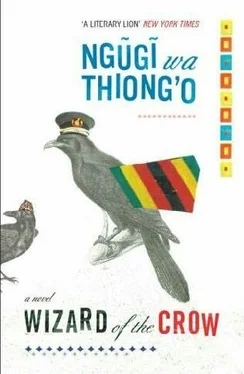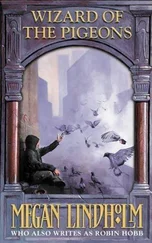“Your Excellency,” interjected Sikiokuu, “I pray you to please believe me when I say that no such conversation about Burls and dollars ever took place between me and this scoundrel.”
The Ruler registered very little of what Sikiokuu had said. His mind was still preoccupied with the three sacks of dollars, for, to him, a bag of dollars was more valuable than all the Burls in Aburlria. He, too, thought the national currency worthless, its value always changing like a chameleon. He now saw Tajirika in a new light: here was a bright mind that knew how to make a dollar out of thin air. Kaniürü and Sikiokuu seemed to him foolish for insisting on being paid in Burls.
“Mr. Tajirika,” he said, turning toward Tajirika, “Kaniürü has told us what he did with his Burls. What did you do with your three bags of dollars?”
All eyes turned to Tajirika.
“I am talking to you, Tajirika,” the Buler repeated. “Are you hard of hearing? What did you do with the three sacks of dollars? With whom did you share the money?” he added, glancing at Machokali.
The tables are turning against me, Tajirika thought to himself. Why did I lie about having dollars?
It was too late to change his story. He would have to live with the untruth, no matter its consequences. From now on, he swore to himself, he would stick to what he knew best: bending the truth as opposed to telling downright lies.
“I left the three bags of dollars with the Wizard of the Crow,” Tajirika said.
The Buler broke into mirthless laughter. Sikiokuu felt life returning. Kaniürü’s nose twitched. Machokali looked at his friend with pity. Couldn’t he come up with a better explanation?
“What?” asked the Buler.
“I left the whole lot with the Wizard of the Crow.”
“I don’t understand. Did you owe him money?”
“It was his fee for curing me.” Tajirika told of his own malady of words. “I was so happy to regain my voice that I did not worry about the fee. At that moment, my giving away the money was no big deal: there was more to be had where that first lot had come from.”
“What did the wizard do with the money?” the Ruler, Machokali, and Sikiokuu asked in unison.
“Three big bags of dollars! Wow!” Kaniürü added, not to be left out.
“When we were locked up in the same prison cell, he told me that he had buried it,” Tajirika said.
They all laughed, as if in agreement that now Tajirika had gone too far with his lies.
“No doubt he failed to tell you where he planted it?” Sikiokuu said sarcastically.
“As a matter of fact,” said Tajirika to the astonishment of all, “he did.”
They quickly looked at one another before turning to Tajirika with the one unspoken question.
“He buried the money in the prairie behind Santalucia.”
“And of course you never went to look for it,” said Kaniürü.
“No,” said Tajirika promptly, “because I assumed the sorcerer was lying to me. And honestly, I did not want to have anything to do with it, and I never will-it’s cursed. Let it remain buried-that is, if he was telling me the truth. And if it does not exist, again, let it be. The Wizard of the Crow is the only one who can enlighten us about the fate of the dollars.”
The Ruler seemed oblivious to Tajirika’s plea. He was obsessed with only one thing: these men had been caught with their own hands deep in the till. Bank records showed that Sikiokuu had pocketed millions, but here he was, busy denying it in the face of a preponderance of evidence. And here was Tajirika with his childish lies. Tajirika was protecting his accomplices, Machokali, perhaps, among others. The only one who had been fairly honest and straightforward was Kaniürü. What do the others believe? That I am a fool? I will show them that this Ruler has still got a trick or two up his sleeve.
“We are not going to decide just yet who is telling the truth and who is not,” the Ruler told them, looking from Sikiokuu to Machokali. “I want you two to give me three of your most trusted police officers or even youthwingers from among those who have had some contact with this Wizard of the Crow and have been courageous in facing him.”
“Peter Kahiga and Elijah Njoya,” said Sikiokuu immediately. “They don’t lie like some people I know, and, most important, they know how to keep their mouths shut.”
“I recommend A.G.,” said Machokali.
“Yes, and A.G.,” Sikiokuu agreed.
“Tajirika. I want you to know that I hate lies being told to me more than anything else. It is better to speak the truth to me, like Kaniürü here, and plead for mercy after than to resort to lies. But I will give you one more chance to redeem yourself. A second chance. A last chance. You have already said that you want nothing to do with the buried treasure. So show Kahiga, Njoya, and A.G. where it is-they will do the unearthing. You are to supervise the digging to keep the police officers honest. But let me warn you! If the dollars are not found, make sure to jump into the hole and beg to be buried in it. Do you understand? I am not to be trifled with.”
Bitterly regretting the moment he had lied about dollars and weak in the knees, Tajirika stood up and staggered toward the door, a broken soul, sure that the task he had been given amounted to a death sentence.
Even Machokali, Sikiokuu, and Kaniürü felt they had just witnessed a death sentence. Tajirika would never be seen alive again, and this made them feel grateful that their own lives had been spared. Kaniürü congratulated himself on his art of lying, which he attributed to his clever head so unlike Tajirika’s. That man was a numskull whose lies screamed to be seen as lies.
Machokali and Sikiokuu thought the same. Both knew that Kaniürü had also lied, but he at least had managed a reasonable cover-up.
Yet their joy was tempered by the fear that they might find themselves strung up by the end of the day. In the silence following Tajirika’s departure under the escort of armed policemen, each was busy figuring out how to save his own skin at the expense of the other two.
The Buler again broke the silence.
“Mr. Sikiokuu,” he called out, “you know, don’t you, that a good shepherd knows a hyena when he sees one, even if it is in sheep’s clothing?”
“Yes, Your Mighty Excellency,” Sikiokuu answered quickly, even as he assumed that the Ruler was about to expose Kaniürü. “May the Ruler be praised for his great inborn wisdom,” added Sikiokuu.
“It comes directly from God,” Kaniürü opined.
“But it also springs from his own efforts,” Sikiokuu said, resenting Kaniürü’s attempt to join his song of praise. “He has mastered all the book learning.”
“He is the true dispenser of knowledge,” said Kaniürü, “the teacher of teachers, the number one teacher. The Ruler is the source of all the knowledge in the world.”
“That’s enough,” the Ruler said, pretending to be angry with their excess. “It is not good to praise a person in his presence; it might embarrass him.”
“I, too, share that sentiment, Your Mighty Excellency,” said Sikiokuu. “Oh, you should hear me when I am not in your presence, for that’s when I feel most free to sing your gifts.”
“I, too, praise you all the time, wherever I am,” Machokali said, not to be outdone.
“Deep in my heart,” Kaniürü said, “I know no calling higher than that of singing your praises at all times because of what you have done and continue to do for us. One day I overheard my own heart saying, If God and the Ruler were standing together side by side and their hats were blown off their heads at the same time, I would pick up the one that belongs to the Ruler first, and without realizing it I had said loudly: Alleluia, may my Lord and Master be praised for ever and ever, Amen.”
Читать дальше












